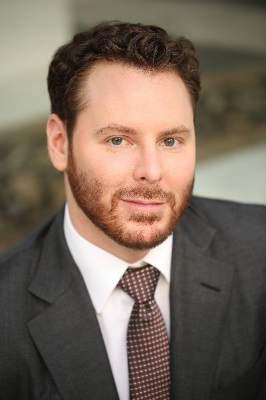User login
A new research institute launched by tech billionaire Sean Parker aims to advance the field of cancer immunotherapy by uniting the country’s top scientists, including Dr. Carl June, Dr. Jedd Wolchok, and Dr. James Allison, who are leaders in the field.
Best known for founding music-sharing service Napster, Mr. Parker has provided a $250 million grant to develop the Parker Institute for Cancer Immunotherapy, a collaboration between researchers, clinicians, and other stakeholders that focuses on expanding immunotherapy research efforts, according to an April announcement by the Parker Foundation.
“We are at an inflection point in cancer research and now is the time to maximize immunotherapy’s unique potential to transform all cancers into manageable diseases, saving millions of lives,” Mr. Parker said in a statement. “We believe that the creation of a new funding and research model can overcome many of the obstacles that currently prevent research breakthroughs. Working closely with our scientists and more than 30 industry partners, the Parker Institute is positioned to broadly disseminate discoveries and, most importantly, more rapidly deliver treatments to patients.”
The Parker Institute for Cancer Immunotherapy will include 40 laboratories and more than 300 researchers from leading cancer centers, including Memorial Sloan Kettering Cancer Center; Stanford Medicine; the University of California, Los Angeles; the University of California, San Francisco; the University of Pennsylvania; and the University of Texas MD Anderson Cancer Center. Each research center will receive comprehensive funding, clinical resources, and key technologies needed to accelerate research discoveries, according to the foundation. In a unique agreement, the administration of intellectual property will be shared between the research centers, allowing scientists to have immediate access to the broad spectrum of core discoveries.
Scientists involved with the institute call immunotherapy “one of the most important medical advances of our time,” and the first approach that could generate long-lasting remissions for all cancer types and stages. The relatively new treatment area mobilizes the body’s own defense systems to fight cancer cells.
“Immunotherapy represents a fundamentally new, breakthrough treatment paradigm in the fight against cancer – it harnesses the body’s own powerful immune system to mobilize its highly refined disease-fighting arsenal to engage and eliminate the cancer cells,” Parker Institute CEO and President Jeff Bluestone, Ph.D., said in a statement. “Our scientists are leaders in the field and will now work together to make discoveries to treat and potentially cure cancer.”
In the 1990s, Dr. Bluestone of the University of California, San Francisco, was one of two scientists who discovered that, to prevent autoimmunity and overreactions, a molecule called CTLA-4 acts as a “brake,” or checkpoint, on the immune response. The finding fueled a new class of checkpoint-blockade treatments for multiple cancers.
The Parker Institute will focus on several initial objectives, including developing novel approaches to modify T-cells to enhance function and creating a new generation of more effective T-cell therapies. Researchers also will work to improve the rates of durable responses and broaden the use of checkpoint-blocking agents, alone or in combination to treat more types of cancer. Finally, scientists will conduct research to advance DNA sequencing, antigenic peptide discovery efforts, and immune monitoring technologies. Their goal is to understand how to more effectively target tumors and ultimately develop new vaccines and T-cell therapies.
A major key of the institute is to remove competition among researchers that silo breakthroughs and instead enhance teamwork, said James P. Allison, Ph.D., of the University of Texas MD Anderson Cancer Center, Houston.
“One of the goals is to try to remove that competitive edge and have everybody bring their skills together,” Dr. Allison said in a video. “Still, you’re trying to do more than the other guy, but you’re doing it with them. So you use that competitive edge to an advantage.”
On Twitter @legal_med
A new research institute launched by tech billionaire Sean Parker aims to advance the field of cancer immunotherapy by uniting the country’s top scientists, including Dr. Carl June, Dr. Jedd Wolchok, and Dr. James Allison, who are leaders in the field.
Best known for founding music-sharing service Napster, Mr. Parker has provided a $250 million grant to develop the Parker Institute for Cancer Immunotherapy, a collaboration between researchers, clinicians, and other stakeholders that focuses on expanding immunotherapy research efforts, according to an April announcement by the Parker Foundation.
“We are at an inflection point in cancer research and now is the time to maximize immunotherapy’s unique potential to transform all cancers into manageable diseases, saving millions of lives,” Mr. Parker said in a statement. “We believe that the creation of a new funding and research model can overcome many of the obstacles that currently prevent research breakthroughs. Working closely with our scientists and more than 30 industry partners, the Parker Institute is positioned to broadly disseminate discoveries and, most importantly, more rapidly deliver treatments to patients.”
The Parker Institute for Cancer Immunotherapy will include 40 laboratories and more than 300 researchers from leading cancer centers, including Memorial Sloan Kettering Cancer Center; Stanford Medicine; the University of California, Los Angeles; the University of California, San Francisco; the University of Pennsylvania; and the University of Texas MD Anderson Cancer Center. Each research center will receive comprehensive funding, clinical resources, and key technologies needed to accelerate research discoveries, according to the foundation. In a unique agreement, the administration of intellectual property will be shared between the research centers, allowing scientists to have immediate access to the broad spectrum of core discoveries.
Scientists involved with the institute call immunotherapy “one of the most important medical advances of our time,” and the first approach that could generate long-lasting remissions for all cancer types and stages. The relatively new treatment area mobilizes the body’s own defense systems to fight cancer cells.
“Immunotherapy represents a fundamentally new, breakthrough treatment paradigm in the fight against cancer – it harnesses the body’s own powerful immune system to mobilize its highly refined disease-fighting arsenal to engage and eliminate the cancer cells,” Parker Institute CEO and President Jeff Bluestone, Ph.D., said in a statement. “Our scientists are leaders in the field and will now work together to make discoveries to treat and potentially cure cancer.”
In the 1990s, Dr. Bluestone of the University of California, San Francisco, was one of two scientists who discovered that, to prevent autoimmunity and overreactions, a molecule called CTLA-4 acts as a “brake,” or checkpoint, on the immune response. The finding fueled a new class of checkpoint-blockade treatments for multiple cancers.
The Parker Institute will focus on several initial objectives, including developing novel approaches to modify T-cells to enhance function and creating a new generation of more effective T-cell therapies. Researchers also will work to improve the rates of durable responses and broaden the use of checkpoint-blocking agents, alone or in combination to treat more types of cancer. Finally, scientists will conduct research to advance DNA sequencing, antigenic peptide discovery efforts, and immune monitoring technologies. Their goal is to understand how to more effectively target tumors and ultimately develop new vaccines and T-cell therapies.
A major key of the institute is to remove competition among researchers that silo breakthroughs and instead enhance teamwork, said James P. Allison, Ph.D., of the University of Texas MD Anderson Cancer Center, Houston.
“One of the goals is to try to remove that competitive edge and have everybody bring their skills together,” Dr. Allison said in a video. “Still, you’re trying to do more than the other guy, but you’re doing it with them. So you use that competitive edge to an advantage.”
On Twitter @legal_med
A new research institute launched by tech billionaire Sean Parker aims to advance the field of cancer immunotherapy by uniting the country’s top scientists, including Dr. Carl June, Dr. Jedd Wolchok, and Dr. James Allison, who are leaders in the field.
Best known for founding music-sharing service Napster, Mr. Parker has provided a $250 million grant to develop the Parker Institute for Cancer Immunotherapy, a collaboration between researchers, clinicians, and other stakeholders that focuses on expanding immunotherapy research efforts, according to an April announcement by the Parker Foundation.
“We are at an inflection point in cancer research and now is the time to maximize immunotherapy’s unique potential to transform all cancers into manageable diseases, saving millions of lives,” Mr. Parker said in a statement. “We believe that the creation of a new funding and research model can overcome many of the obstacles that currently prevent research breakthroughs. Working closely with our scientists and more than 30 industry partners, the Parker Institute is positioned to broadly disseminate discoveries and, most importantly, more rapidly deliver treatments to patients.”
The Parker Institute for Cancer Immunotherapy will include 40 laboratories and more than 300 researchers from leading cancer centers, including Memorial Sloan Kettering Cancer Center; Stanford Medicine; the University of California, Los Angeles; the University of California, San Francisco; the University of Pennsylvania; and the University of Texas MD Anderson Cancer Center. Each research center will receive comprehensive funding, clinical resources, and key technologies needed to accelerate research discoveries, according to the foundation. In a unique agreement, the administration of intellectual property will be shared between the research centers, allowing scientists to have immediate access to the broad spectrum of core discoveries.
Scientists involved with the institute call immunotherapy “one of the most important medical advances of our time,” and the first approach that could generate long-lasting remissions for all cancer types and stages. The relatively new treatment area mobilizes the body’s own defense systems to fight cancer cells.
“Immunotherapy represents a fundamentally new, breakthrough treatment paradigm in the fight against cancer – it harnesses the body’s own powerful immune system to mobilize its highly refined disease-fighting arsenal to engage and eliminate the cancer cells,” Parker Institute CEO and President Jeff Bluestone, Ph.D., said in a statement. “Our scientists are leaders in the field and will now work together to make discoveries to treat and potentially cure cancer.”
In the 1990s, Dr. Bluestone of the University of California, San Francisco, was one of two scientists who discovered that, to prevent autoimmunity and overreactions, a molecule called CTLA-4 acts as a “brake,” or checkpoint, on the immune response. The finding fueled a new class of checkpoint-blockade treatments for multiple cancers.
The Parker Institute will focus on several initial objectives, including developing novel approaches to modify T-cells to enhance function and creating a new generation of more effective T-cell therapies. Researchers also will work to improve the rates of durable responses and broaden the use of checkpoint-blocking agents, alone or in combination to treat more types of cancer. Finally, scientists will conduct research to advance DNA sequencing, antigenic peptide discovery efforts, and immune monitoring technologies. Their goal is to understand how to more effectively target tumors and ultimately develop new vaccines and T-cell therapies.
A major key of the institute is to remove competition among researchers that silo breakthroughs and instead enhance teamwork, said James P. Allison, Ph.D., of the University of Texas MD Anderson Cancer Center, Houston.
“One of the goals is to try to remove that competitive edge and have everybody bring their skills together,” Dr. Allison said in a video. “Still, you’re trying to do more than the other guy, but you’re doing it with them. So you use that competitive edge to an advantage.”
On Twitter @legal_med

